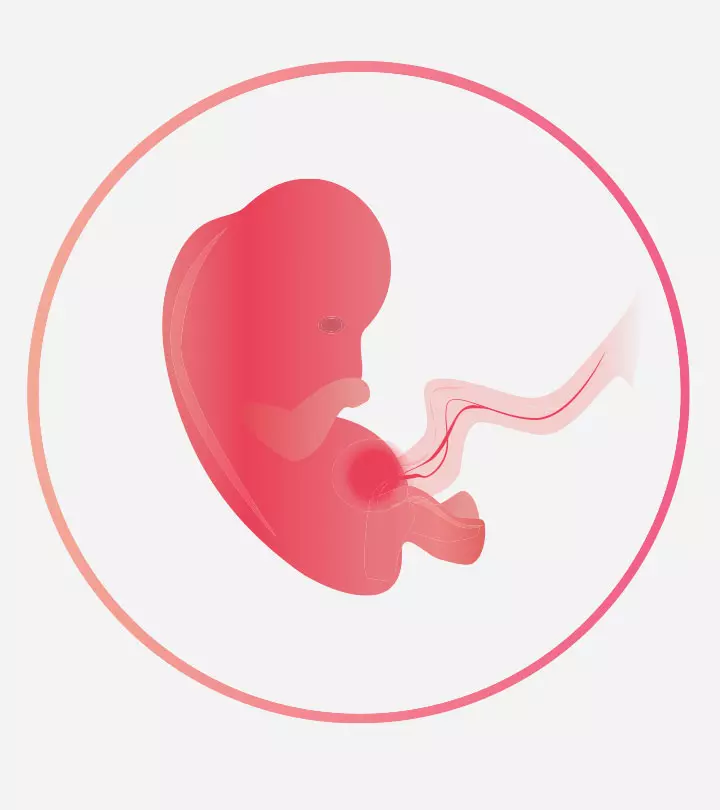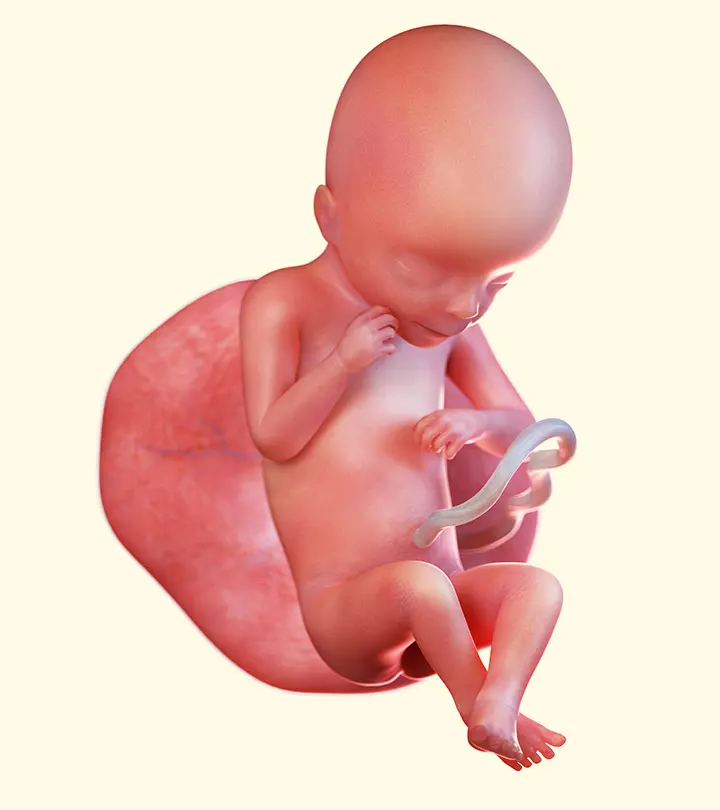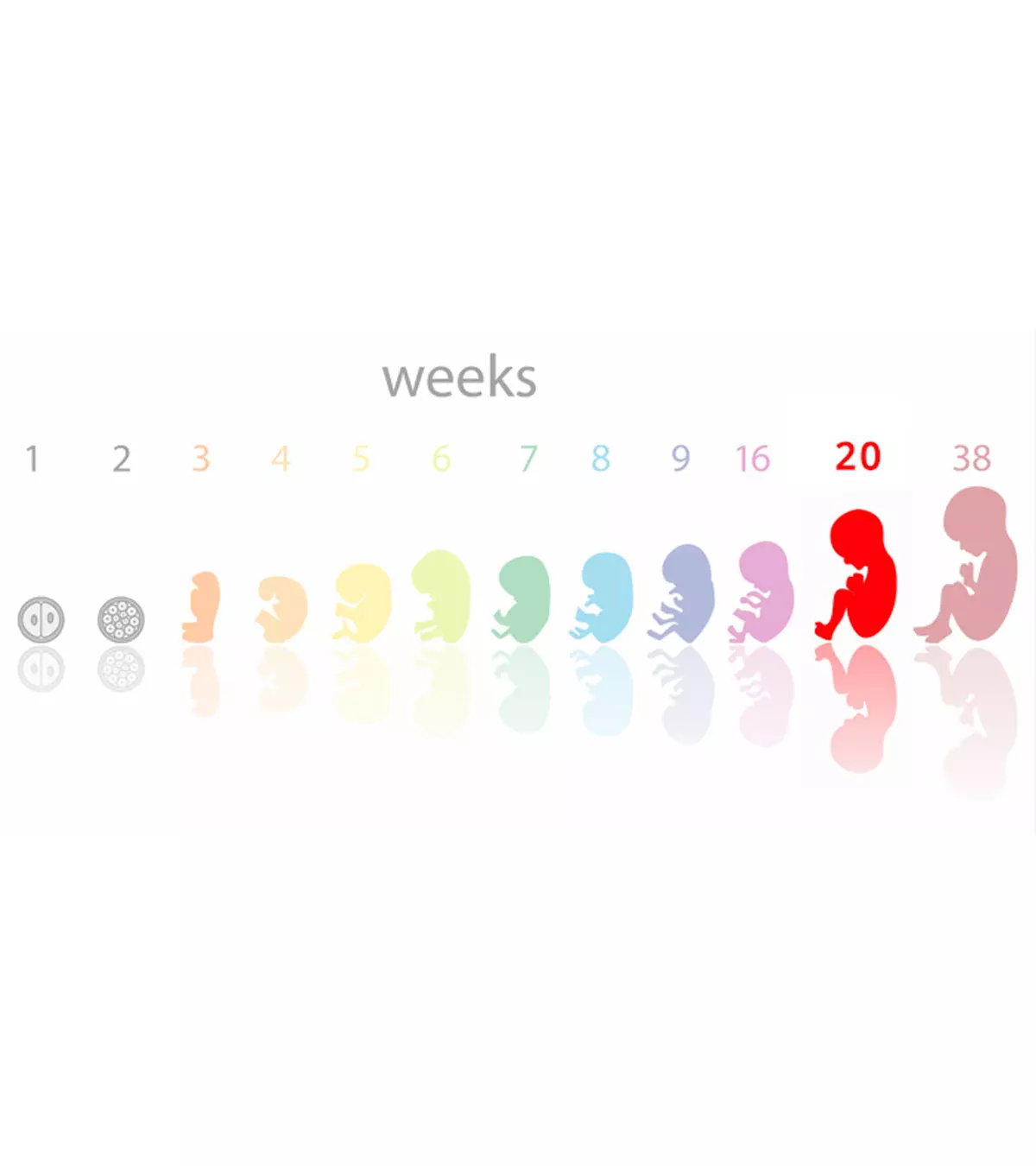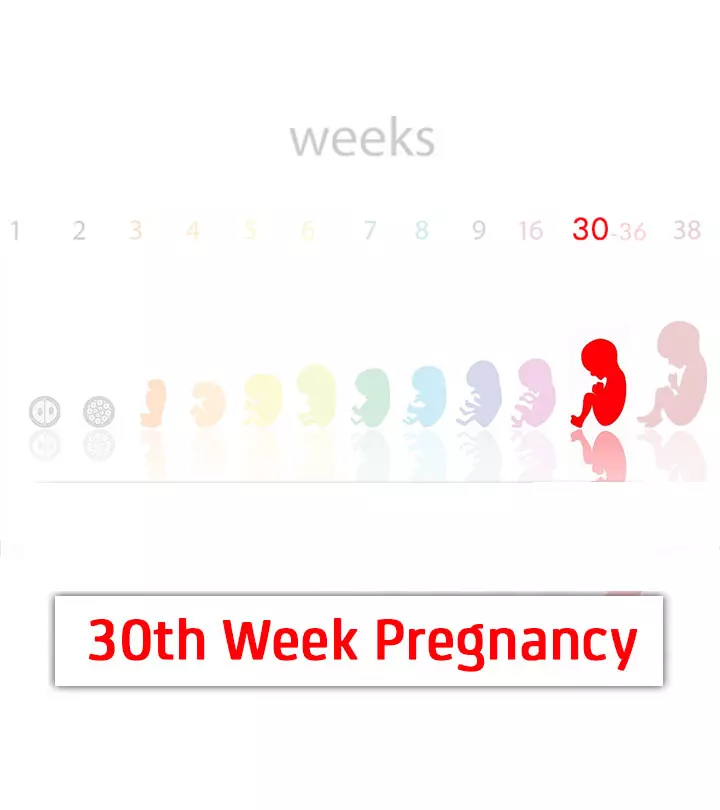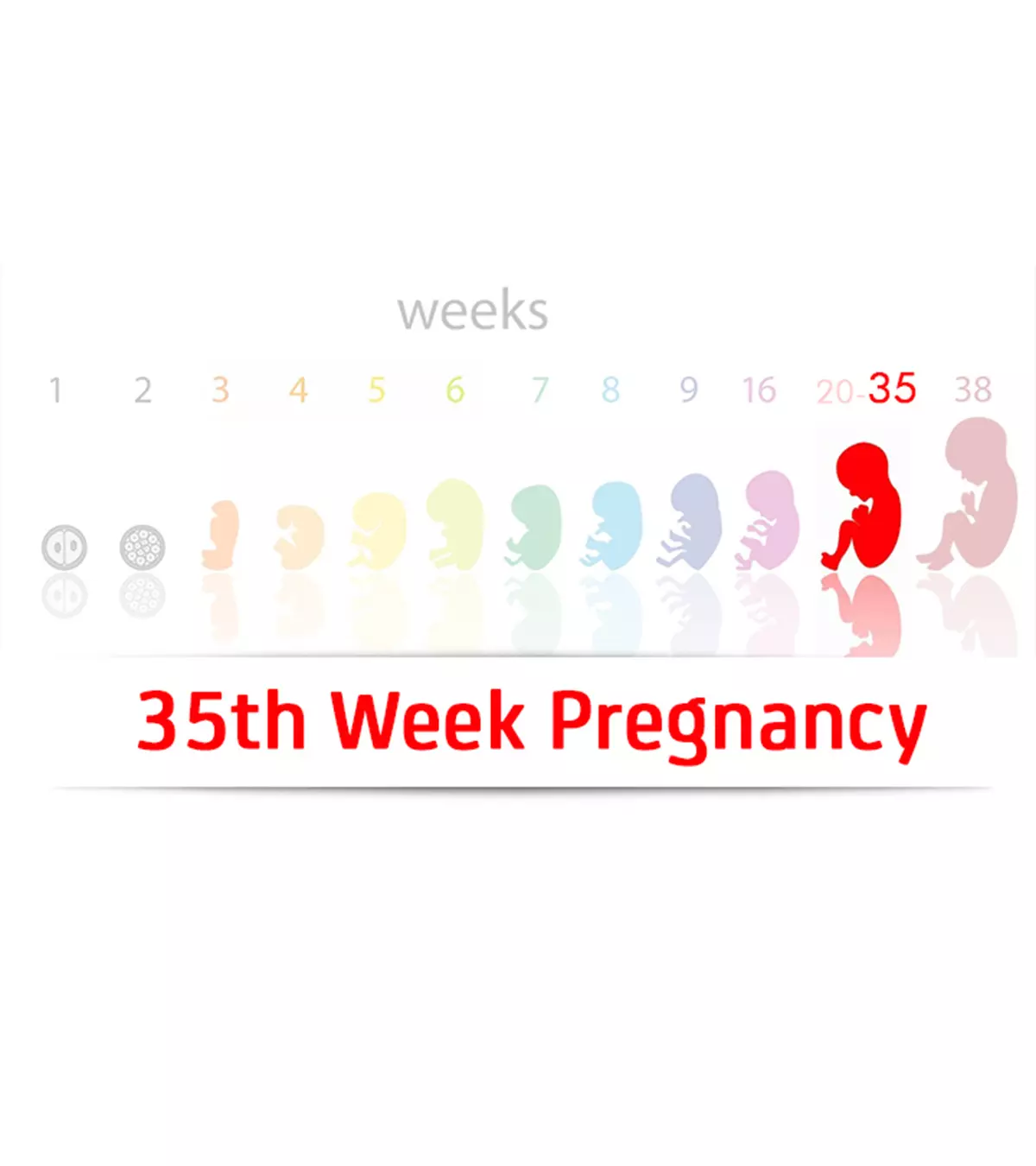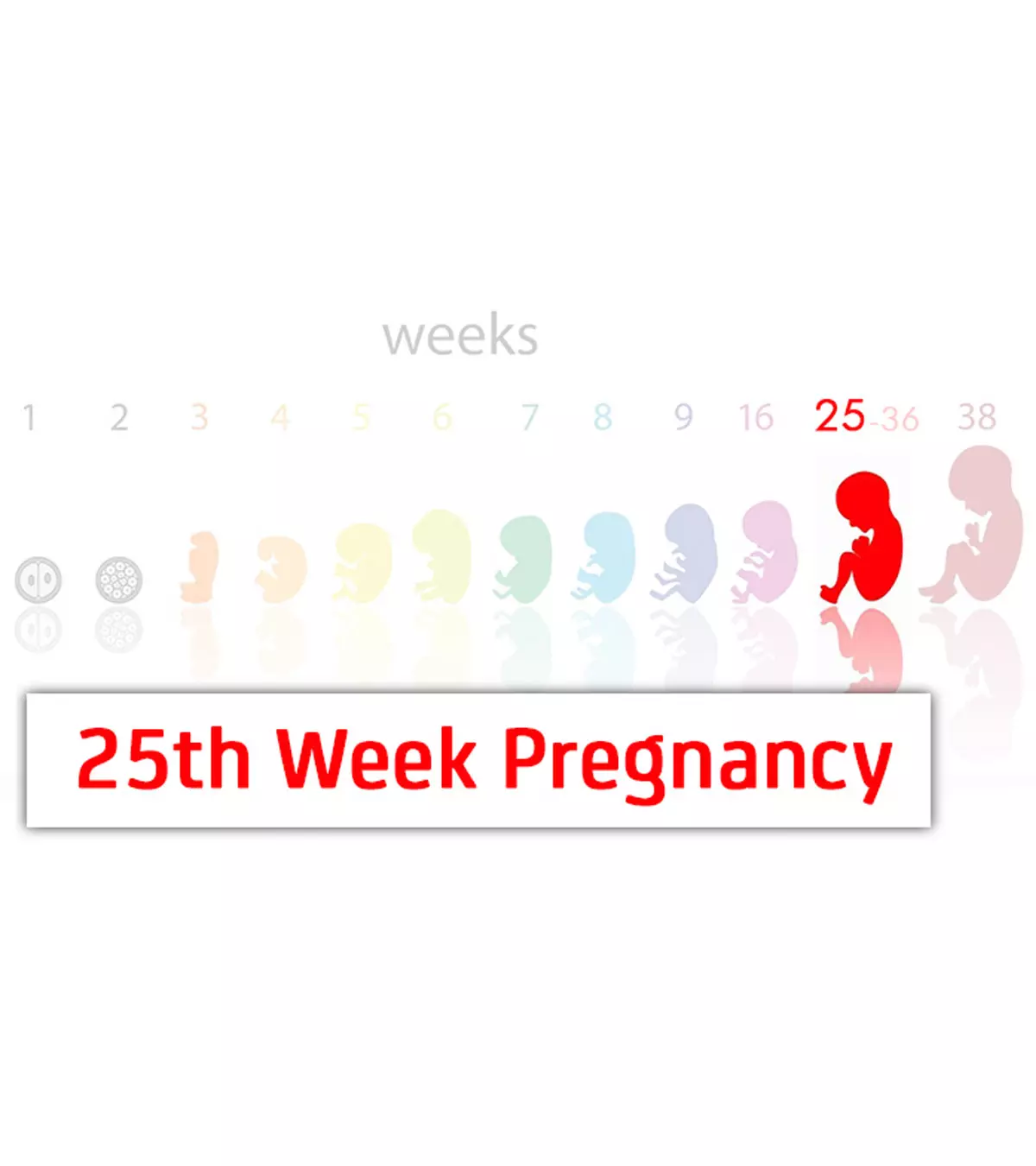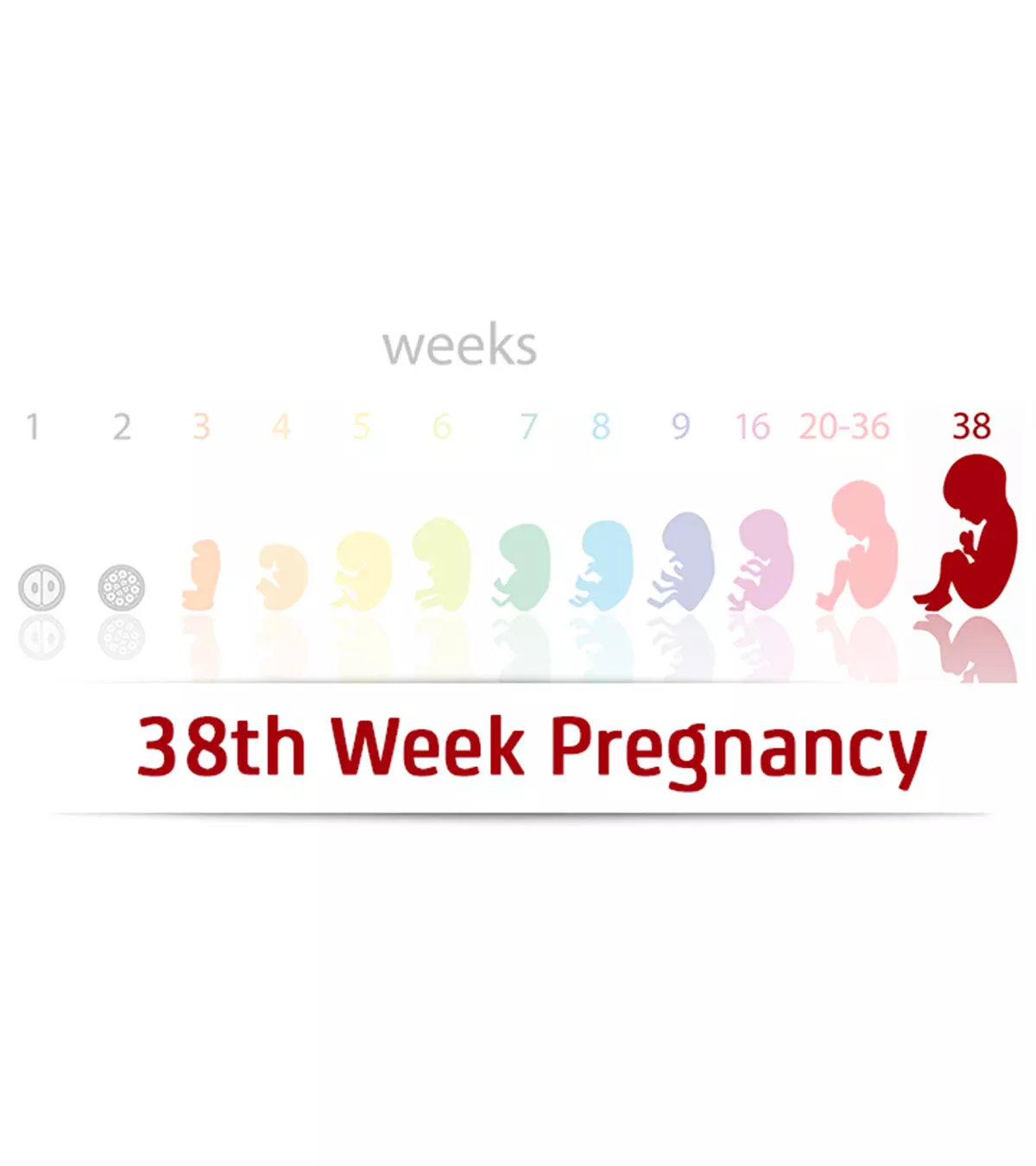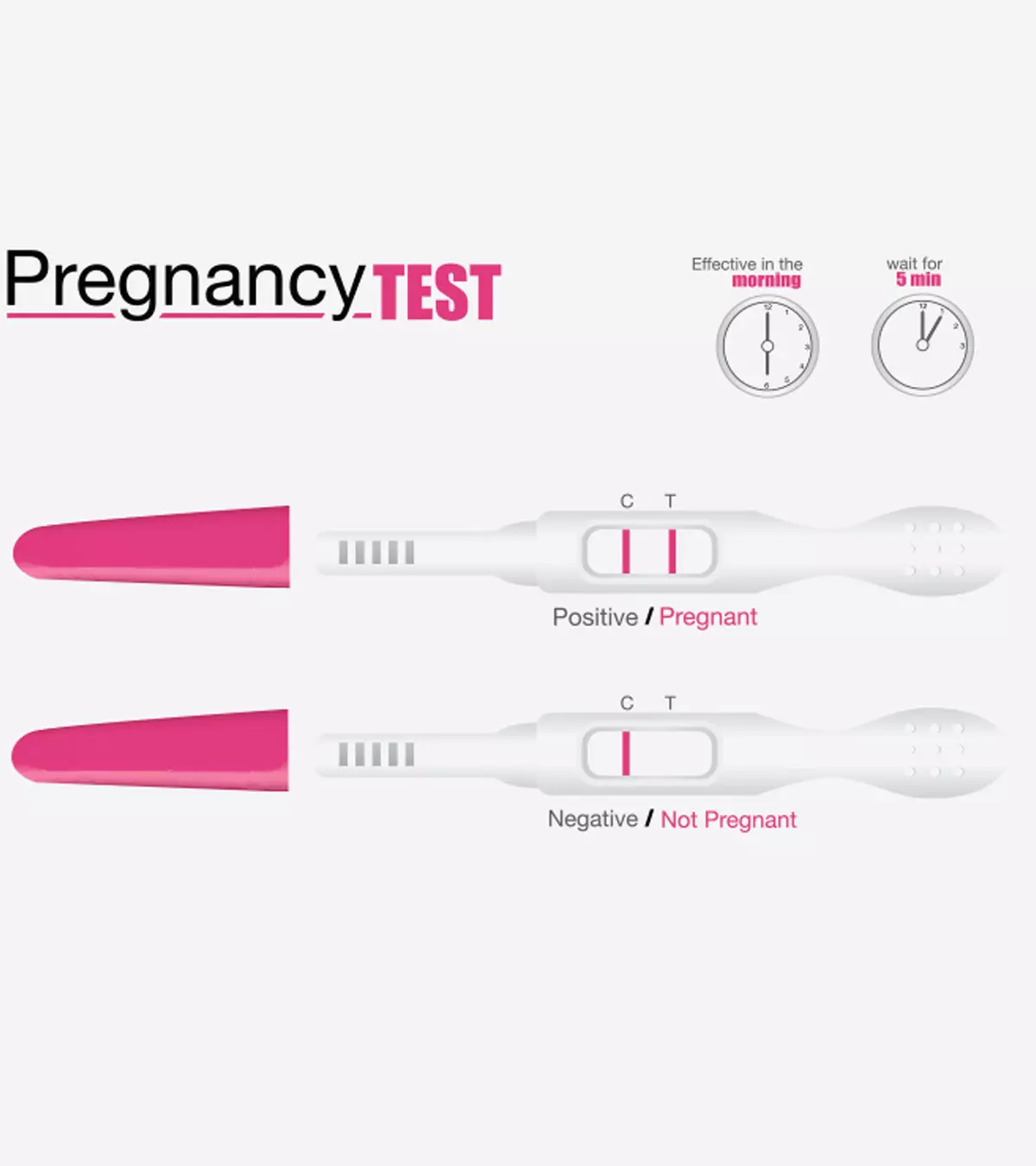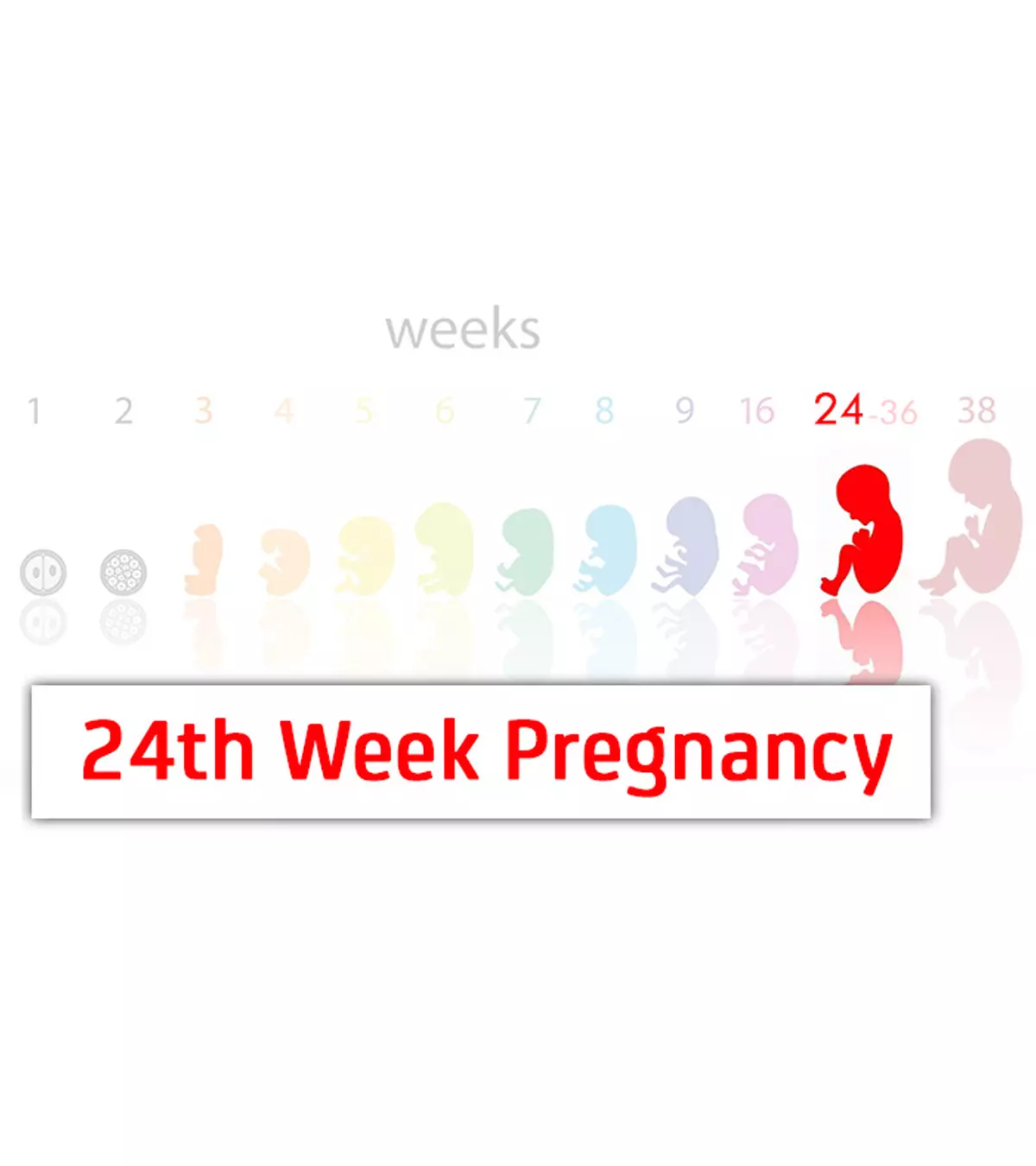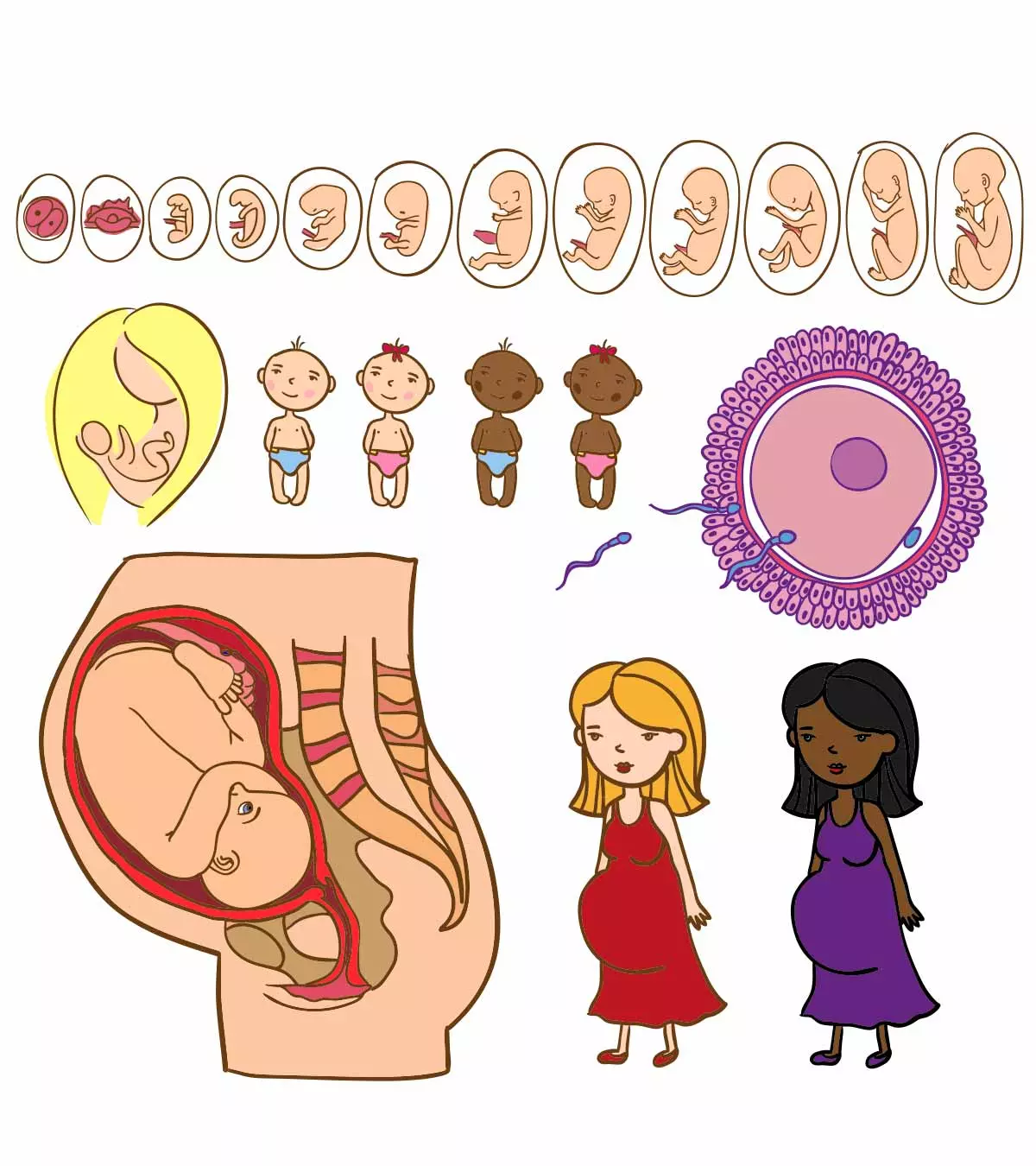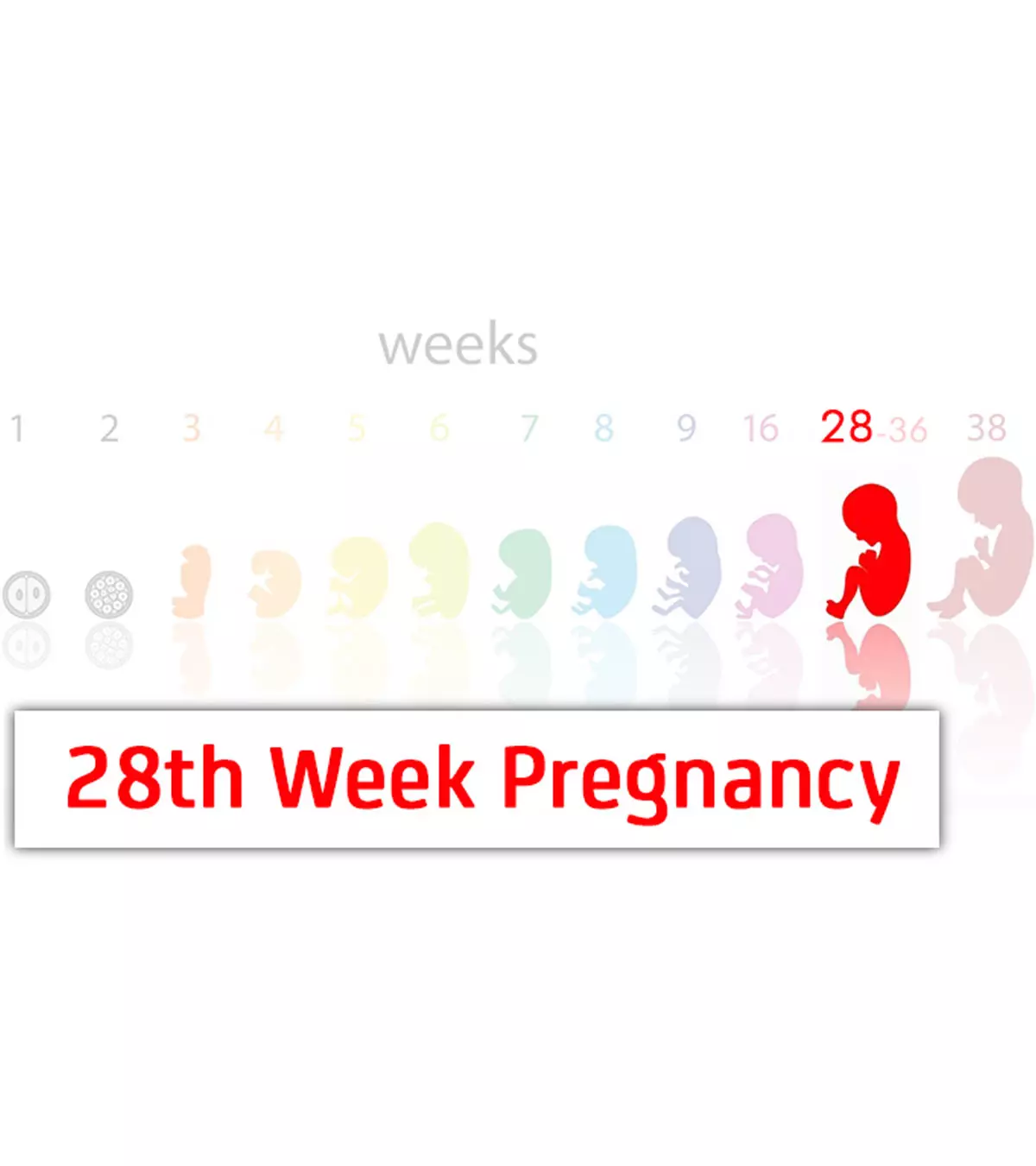
Image: Shutterstock
At 28 weeks pregnant, you and your baby undergo several changes. While your belly increases and causes you several discomforts, your baby is now the size of an eggplant and can move their limbs, sleep, and dream.
If you are an expectant mother, knowing more about the changes a mother and her baby experience during this crucial week of pregnancy can help you get all the necessary prenatal care and stay informed. Besides, it will help you enjoy some merry time, knowing how you and your baby change every week. Read on.
Key Pointers
- At 28 weeks, the fetus is about 14.8 inches long and weighs 2.22 to 2.7 pounds, resembling an eggplant.
- The baby’s different body systems develop, and they can now use reflexes like moving, sucking, and coughing.
- The mother may experience shortness of breath, sleep issues, gastrointestinal symptoms, and false contractions.
- Mothers should monitor the baby’s movements, aiming for 10 kicks in two hours.
- Proper fetal growth requires adequate fluids, nutrient-rich food, and prescribed supplements.
Size Of Your Baby At Week 28
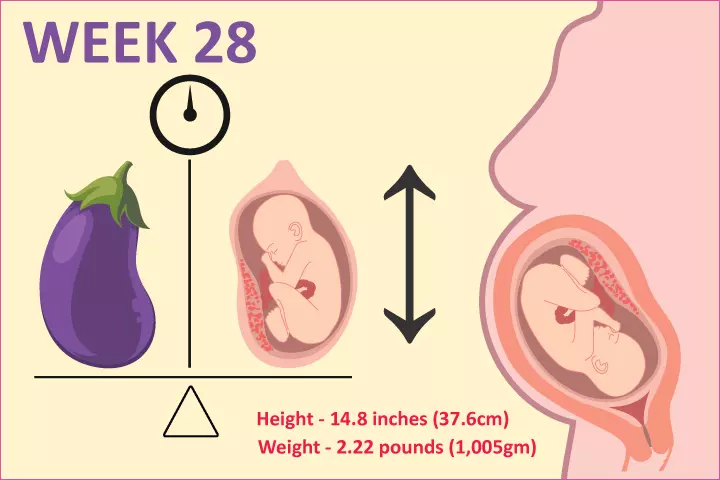
Your baby is about the size of an eggplant, measuring 14.8 inches (37.9cm) and weighing 2.22-2.7lb (1,005-1210g) (1).
Baby’s Development In Week 28
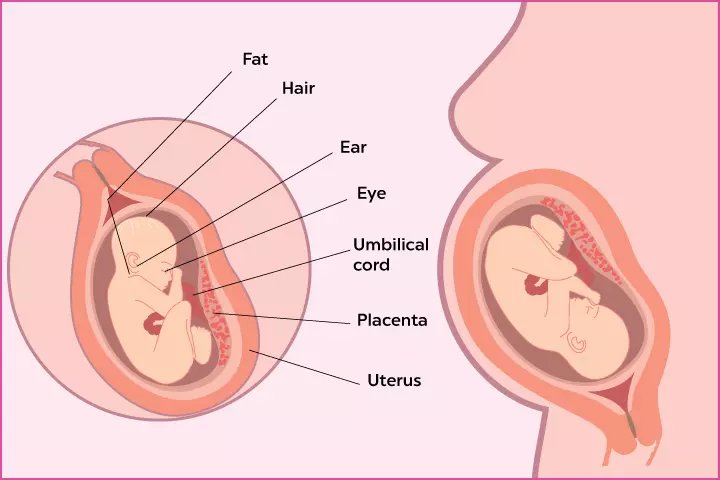
All of the major body systems are in place and functioning. But there is a lot more development ahead.
Reflexes: Baby gains skills such as sucking, moving limbs, walking, breathing, coughing, and hiccupping (2).
Lungs: The lungs are stronger and more developed now than before to support the baby’s life outside the womb (3).
Skin: Greasy vernix (cheesy, white substance that coats and protects the baby’s skin inside the uterus) and lanugo (fine, soft hair) start to disappear improving the appearance of the skin. The body fat deposits (nearly two to three percent) underneath the skin make it smooth and supple, ironing away the wrinkles (4).
Brain: The folds and grooves of the brain continue to develop and become more prominent (5).
Heart: Heart rate slows down to about 140 beats per minute, which is double the mother’s heart rate.
Endocrine system: The enzymes and endocrinological processes develop at a faster pace (6). The baby’s adrenal glands produce androgen and estrogen, which stimulate the mother’s hormones to produce milk.
Rapid eye movement (REM) sleep: Your baby spends more time in REM sleep and dreams, resulting in high body movements (7).
Hair: The baby can be born bald, with invisible hair, or with thick hair. Researchers also found a link between heartburn and fetal hair growth (8).
Muscle growth: Muscles develop, become toned and strong. This gives a plumpy look to the fetus (9).
Placenta: The placentaiA temporary organ that develops during pregnancy and provides the fetus with oxygen and nutrients. grows, and the blood flow in it increases to support the baby’s quicker growth in the final trimester.
Eyes: Eyes and eyelashes continue developing and can produce tears (10).
 Quick fact
Quick factBody Changes In This Week
As you transition into the third trimester, you may experience physical, emotional, and mental changes. Here are some changes in your body this week that may cause discomfort:
- Trouble falling asleep: The closer you are to the due date, the more difficult it might be to sleep. You may snore due to hormonal or nervous system changes (11). A meta-analysis by researchers from the University of Calgary, Canada, the University of Denver, USA, and the Alberta Children’s Hospital Research Institute for Child and Maternal Health (ACHRI), Canada, shed light on this issue. The analysis included 24 studies involving 15,564 participants and revealed that the overall prevalence of insomnia symptoms during pregnancy was 38.2%. Notably, the trimester played a significant role, with the prevalence of insomnia symptoms being higher in the third trimester (39.7%) than in the first (25.3%) and second (27.2%) trimesters.
- Shortness of breath: The growing fetus shields the lungs and diaphragmiDome-shaped muscular structure present below the lungs, involved in the respiration process. , which might make breathing difficult.
- Aches and pains: The hormonal fluctuations and changes might make you feel uncomfortable, especially when you are carrying twins. Stretches, yoga, walking, swimming, or prenatal massages could help. However, do check with your obstetrician before taking up these exercises. You can also wear a maternity belt to help relieve pressure and reduce aches.
- Braxton Hicks contractions: They are false contractions that help the body to get ready for labor contractions. They are occasional, but if they continue to be regular, they could be preterm contractions, and you must see your midwife or doctor (12).

- Leaky breasts: Breasts produce colostrum, a yellowish substance, which is the baby’s first food (14).
- Uterus reposition: As you progress towards the delivery, the uterus moves above the belly button. The uterus stretches, and the ligamentsiA connective tissue that connects bones in the joints, providing stability and flexibility. that support it are pulled in (15).
- Constipation: You might face this problem as your uterus exerts pressure on the colon. Include plenty of fiber in your diet and drink a lot of water.
- Heartburn: As the uterus moves above the belly button, it exerts pressure on the stomach and interferes with digestion. This might cause acidity and heartburn (16).
- Gas and bloating: Pressure exerted on the rectum and inefficient digestive system causes gas and bloating. Eat six short meals at equal intervals to avoid the problem.
- Restless leg syndrome (RLS): You may experience a temporary uneasiness in your legs along with a tingling sensation, making it difficult to move them. Massage and stretch your legs for relief. Also, cut down on caffeine. The doctor may prescribe iron supplements (16).
- Stretch marks: The belly stretches the skin, making it itchy. You may get red marks on your belly and stretch marks will become prominent. These marks will remain for the rest of your life (17).
- Sciatic nerve pain: The baby settles into the correct position for delivery. Due to this, the head and the growing uterus put extra pressure on the sciatic nerveiA nerve present in the lower back (along the hips), which, when damaged, may cause severe shooting pains. causing excruciating pain in the lower buttocks, and back and legs may become numb (18).
- Rhythmic movements in the womb: Movements could be felt when your baby is having hiccups inside the womb. Some mothers report them as tickling sensations or small jerks. These help you bond with your baby. Sometimes, they are hard to identify and you should not worry about them.
Julia, a mother to four children, shares about her 28-week pregnancy when she was pregnant with Baby #3. She recalls, “I’m feeling pretty good for the third trimester! Still have some occasional back pain if I do too much, still totally exhausted some days.
“Still sleeping well for the most part, a little more tossing and turning to get comfortable since I really like to lay slightly on my stomach. Sometimes I wake up totally ready to start the day at 5 am and other days I am DRAGGING at 7 am. And nighttime is the same: some days I am exhausted by 8 pm and other days I can stay up until midnight without a problem (i).”
 Things to know
Things to know Besides the above, if there are any other symptoms that you experience during the 28th week, you should check with the doctor.
Size Of Your Growing Belly
Your belly is growing larger. Your baby is now strong enough to kick your ribs.
Your doctor will measure your belly and the fundal height (from pubic bone to top of the uterus), which is usually 26 to 30cm. Sideways or breech position can give incorrect measurements. If you are carrying twins, fundal height is not taken into account as it is difficult to measure (19).
You can begin to count the kicks to keep a tab on how the baby is moving (20). Choose a time of the day and set the timer to count ten kicks. It may take no more than two hours. Count for a few days to get an average and let the doctor know if the frequency changes considerably.
Prenatal Visit During The 28th Week Of Pregnancy
The third trimester begins this week. From now on, you should be visiting your Obs/Gyn fortnightly and, from 36 weeks, weekly.
- Lab tests: HIV and syphilisiA sexually transmitted bacterial infection typically causing sores in the genital and oral regions, linked to fetal complications. are checked through blood tests and ChlamydiaiSexually transmitted bacterial infection causing pain and abnormal discharge in women, sometimes linked to adverse pregnancy outcomes. and gonorrheaiSexually transmitted bacterial infection, which, when untreated, may increase the risk of negative pregnancy outcomes. are checked through culture tests. If your glucose screening results show high glucose, then a three-hour glucose tolerance test would be done. The glucose level will be high if your body is unable to metabolize food efficiently, and can be controlled by modifying your diet.
- Rh follow-up: If the preliminary tests show you are Rh negative and your baby is Rh positive, you will be given a Rhogam (Rh immune globulin)injection. This will keep your body from developing antibodies that can attack the fetal blood. The next test for Rh in the baby will be scheduled only after birth. If the baby is Rh positive, you will get another shot to prevent complications in future pregnancies (21).
- Tdap vaccine: You will be given Tdap vaccine around the third trimester (22). Even if you had taken a shot of Tdap before pregnancy, you would have to repeat it. It is a vaccine against tetanusiBacterial infection affecting the nervous system and causing painful spasms in the body, which is preventable through vaccination. , diphtheriaiBacterial infection that affects the respiratory tract, causing breathing and swallowing difficulties, preventable by a vaccine. , and pertussisiContagious respiratory tract infection causing whooping cough, preventable by vaccine. for the baby.

- Ultrasound: Your baby will be very active – moving her limbs, turning her face, and blinking her eyes in response to light. The baby’s weight and placental blood flow are checked at every visit.
Essential Tips For Your 28th Week Of Pregnancy
You are getting closer to your due date, and you should take care of yourself and the baby.
- Keep a check on baby’s movements: Your baby may frighten you with her kicks and punches as she is mostly active. If the movements slow down, check with your doctor.
- Skincare: Your abdomen may itch due to the expanding skin. If the itchiness is severe, it can be a sign of obstetric cholestasis (rare liver disorder), and you should contact your doctor immediately.
- Foot comfort: You may be susceptible to bumping into tables and tripping over your feet because of the shifting center of gravity due to loosened joints. You must avoid wearing high heels and footwear that can cause discomfort. Wear flat shoes and look where you walk.
- Sign up for classes: It’s time to sign up for instruction classes. Check with your delivery hospital or your doctor’s office for information on breastfeeding seminars, delivery classes, infant care and other meetings that might interest you and your partner. Before going for any childbirth classes, ensure the instructor is certified by a childbirth educator organization.
- Look out for a pediatrician: It is the best time to find the best doctor for your baby as they would tell you about post-pregnancy diet, baby care, etc..
- Prepare for labor: Though the delivery is about three months away, you should start preparing. Talk to an expert on the exercises you can do to have an easy delivery.
- Enjoy the moment: Take regular walks, go on dinner dates, pen down your thoughts about your baby, and indulge in things that calm you down.
- Photo time: A prenatal photo shoot in some gorgeous maternity clothes would be a good idea to cherish your pregnancy forever.
- Avoid being alone: Staying alone is a strict no-no. You should have your partner or family around as you could fall asleep suddenly, be tired, have fatigue or go through pre-birth anxiety.
- Safe air travel: Drink a lot of water and get up to stretch your legs often. While sitting, rotate, and flex your ankles to avoid swelling and clots. Always carry medical records and doctors’ contacts.

- Avoid sitting for longer: Do not stick to one position for long as this will restrict the blood circulation. Also, do not sit with crossed legs. It may cut off circulation to your already cramped legs making it more painful.
Nutrition In The 28th Week Of Pregnancy
A healthy diet is very important at any stage of pregnancy.
- Fluid requirement: You need to drink about five liters of fluids, mostly water. This keeps you hydrated, and eases the nutrient movement to the fetus. It also reduces chances of constipation, piles, and urinary tract infections.
- Calcium and vitamin D: Calcium and vitamin D are essential for the healthy growth of baby’s bones, muscles, and teeth. You can get them from beans, spinach, kidney beans, soya, almonds, sesame seeds, and dairy products. Vitamin D is also available in fortified milk, eggs, and fish. Your doctor may prescribe supplements if your nutrient count is low.
- Iron: Your iron requirement will be higher during the third trimester as the baby absorbs a majority of your body’s iron. Include more beans, spinach, tofu, beef, chicken, jaggery, peanuts, corn, and enriched cereals in your diet.
- Power snacks: Eat nutrient and energy-rich snacks such as fresh and dried fruits, steamed buns, salad, soybeans, sandwiches, soupy noodles, and nuts.
- Maximum nutrition: Include more whole grain foods such as brown rice, wheat germ, wheat bran, multi-grain flour, and bread. However, excess of these foods can affect your ability to absorb iron, calcium, and zinc. Therefore you should take them in moderation. You could:
- Steam food in a pressure cooker to retain vital nutrients.
- Avoid overcooking as it can deplete nutrients.
- Eat freshly prepared foods since reheating them can deplete their nutritional content.
- Avoid eating junk and sugar-laden foods each time to satisfy your cravings. Instead, try to pick healthier options.
- Avoid caffeine: Cut down caffeine intake as it increases the chances of acidity.
Activities That You Can Take Up
Choose a doctor for your little one:
Make a list of all the pediatricians. Check whether their clinic is closer to you and check for the available facilities.
Have a pregnant friend: You could opt for pregnant forums or sessions where you can meet other pregnant women. You could share your ups and downs of pregnancy and discuss anxieties and troubles. This would help in calming you down.
Tips For Dads-To-Be
- Involve in decision-making as the due date approaches.
- Love your wife and comfort her. She may be anxious and you should help her calm down.
- Read books related to pregnancy, watch pregnancy videos, or talk to other parents who have experienced it earlier.
- Practice relaxation techniques along with your partner.
- Try to become a compassionate partner and an invaluable helper to your better-half.
Pregnancy Checklist At 28 Weeks
A few quick reminders for the week:
- Schedule for the 30th week prenatal appointment
- Start making kick counts (fetal kicks)
- Do not forget to take prenatal vitamins as prescribed
- Try discovering pain relief options for the due time
Frequently Asked Questions
1. How many months is 28 weeks?
28 weeks is seven months of pregnancy or beginning of the third trimester.
2. What is the baby breech position at 28 weeks in pregnancy?
Breech position is where the baby is with her buttocks or feet down, unlike head-down position (normal birth position). This deviation may be caused due to repeated pregnancies, uterus abnormalities, fetal malformations, Hydramnios (excess amniotic fluid), or low lying placenta (23).
3. Is it safe to have sex when you are 28 weeks pregnant?
Most doctors say that it is quite safe to have sex even in the 28th week of pregnancy (24). It adds to the positive emotion in the expectant mother. But you should ensure that you do not press or put weight on the belly.
4. Is it safe to fly during the 28th week of pregnancy?
It is completely safe to fly during 14 to 28 weeks of pregnancy. During the first trimester, there is a chance of miscarriage and you may have the symptoms of toxicosis. In the final trimester, there are chances of preterm labor and delivery and sitting may be uncomfortable. But you must check with your gynecologist and get her approval before you take a flight.
5. How much should you weigh during the 28th week of pregnancy?
The pace of weight gain increases rapidly in your seventh month. The expectant mother should try gaining 50 grams every day or 300 grams a week. Know what you are eating and control if you are consuming excess food. On an average you should gain about 11 to 16kg throughout your pregnancy (25). You should discuss weight concerns with your practitioner in your next checkup.
You should discuss weight concerns with your practitioner in your next checkup.
6. Why does bleeding occur in the 28th week of pregnancy?
Sometimes, you may bleed in your third trimester. It could happen due to placenta previa or placental abruption. In placenta previa, the placenta comes out before the baby does and blocks the cervix (26). Placental abruption is another cause where the placenta separates from the uterus before labor. This can also lead to severe bleeding along with other symptoms (27).
7. Do babies sleep excessively at 28 weeks pregnant?
At 28 weeks, babies sleep more during the day and move more from head-down to feet-down or sideways at night. It is also the time when the baby’s hearing, smell, and touch senses develop (28) (29) (30).
8. Do I need a full bladder for my 28-week pregnancy scan?
An ultrasound scan at 28 weeks of pregnancy helps determine the pregnancy’s viability. Doctors usually ask pregnant women to come with a full bladder an hour before the scan. Then, they ask the women to empty their bladder 90 minutes before exam time and again drink one 8-ounce glass of fluid in any form (31). Fluid-filled bladder and amniotic sac in pregnancy have good transmission of sound waves helping doctors see the organs behind them clearly (32).
When 28 weeks pregnant, you may experience new discomforts such as trouble sleeping, bloating, or tingling sensation in the legs due to the growing uterus. On a positive note, this is also the period when you may start to feel your baby’s movements intensely. Since the delivery is only a few weeks away, you can now start preparing for the delivery and tips to care for your newborn. Ensure to maintain a healthy lifestyle, continue your prenatal checkups and stay vigilant for any unforeseen signs.
Infographic: Fetal Development At 28 Weeks
Being 28 weeks pregnant means you’ve entered your third trimester. At this stage, the baby grows rapidly in the womb and becomes as big as an eggplant. Check out the infographic below to learn about various developmental changes your fetus goes through at this stage of pregnancy.

Illustration: Momjunction Design Team
Illustration: 28 Weeks Pregnant: Symptoms Baby Development And Changes
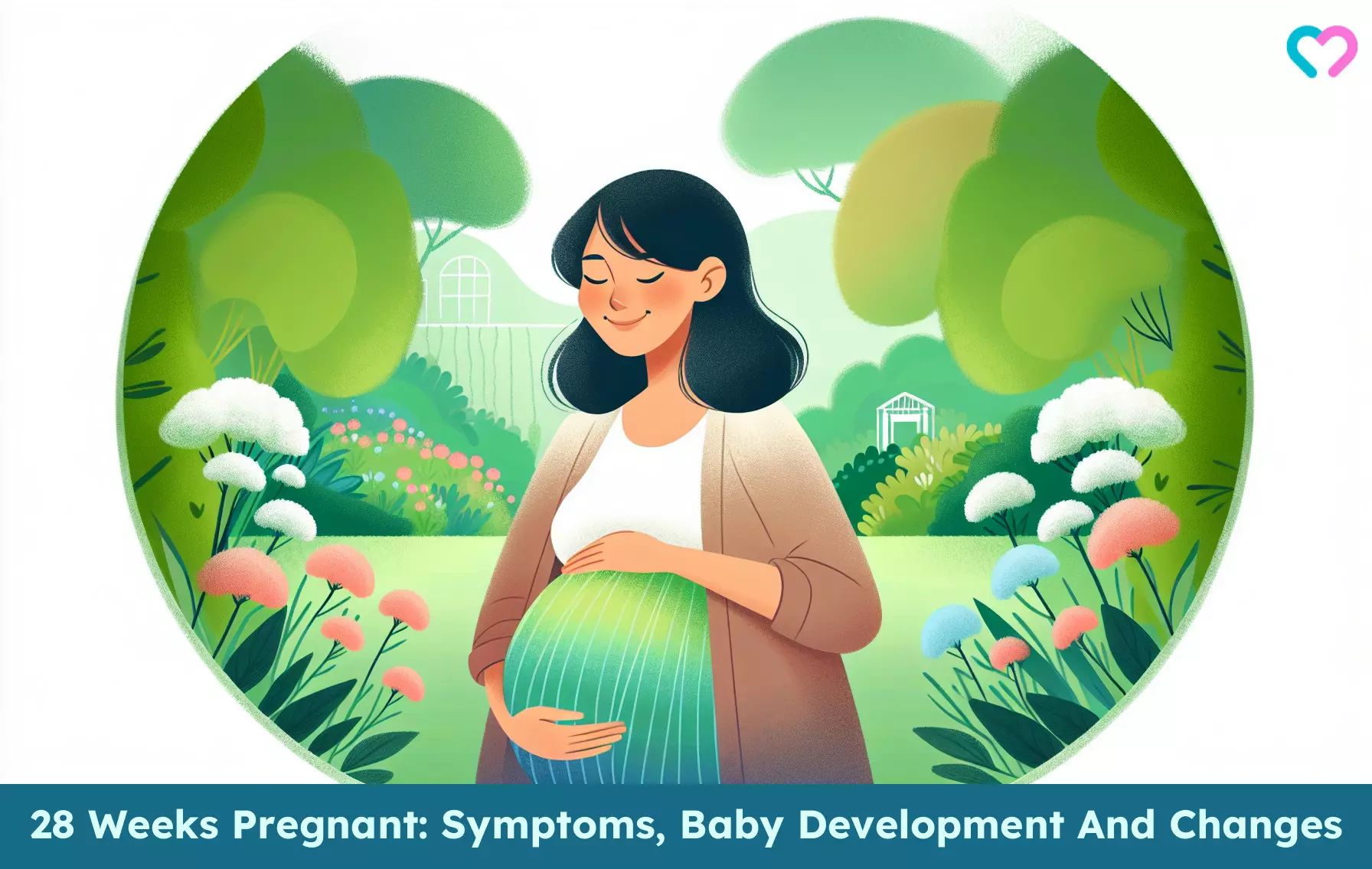
Image: Dall·E/MomJunction Design Team
Personal Experience: Source
MomJunction articles include first-hand experiences to provide you with better insights through real-life narratives. Here are the sources of personal accounts referenced in this article.
i. Baby #3: 28 weeks;https://kajaletsgo.wordpress.com/2021/05/
References
- Moms to Be: From Seed to Melon.
https://www.aces.edu/blog/topics/efnep/from-seed-to-melon/ - Janet A. DiPietro et al.; (2015); Studies in Fetal Behavior: Revisited, Renewed, and Reimagined.
https://www.ncbi.nlm.nih.gov/pmc/articles/PMC4835043/ - Stages of Fetal Development – Third Trimester.
https://ldh.la.gov/page/stages-of-fetal-development-third-trimester - Gurcharan Singh and G Archana; (2008); Unraveling The Mystery Of Vernix Caseosa.
https://www.ncbi.nlm.nih.gov/pmc/articles/PMC2763724/ - Fetal development.
https://medlineplus.gov/ency/article/002398.htm - I Matsumura et al.; (1987); [Relation between size of fetal and neonatal adrenal glands and steroid levels in maternal and neonatal serum].
https://pubmed.ncbi.nlm.nih.gov/2963083/ - M O’Keeffe and M-P St-Onge; (2013); Sleep duration and disorders in pregnancy: implications for glucose metabolism and pregnancy outcomes.
https://www.ncbi.nlm.nih.gov/pmc/articles/PMC3836666/ - Kathleen A Costigan et al.; (2006); Pregnancy folklore revisited: the case of heartburn and hair.
https://pubmed.ncbi.nlm.nih.gov/17150070/ - Measurement of Fetal and Infant Maturity.
https://www.ncbi.nlm.nih.gov/books/NBK11382/ - Fetal Growth And Development.
https://doh.sd.gov/media/bnemplje/fetal.pdf - Get a Good Night’s Sleep During Pregnancy.
https://www.hopkinsmedicine.org/health/conditions-and-diseases/staying-healthy-during-pregnancy/get-a-good-nights-sleep-during-pregnancy - Braxton Hicks contractions.
https://www.pregnancybirthbaby.org.au/braxton-hicks-contractions#:~:text=What%20are%20Braxton%20Hicks%20contractions - The Intradermal Test for Pregnancy in Medical Practice.
https://www.ncbi.nlm.nih.gov/pmc/articles/PMC1584046/pdf/vetsci00132-0026.pdf - You And Your Baby: Month-By-Month.
https://hospital.uillinois.edu/primary-and-specialty-care/family-birth-place/prenatal-care/your-pregnancy-overview/you-and-your-baby-month-by-month - Prenatal care in your third trimester.
https://medlineplus.gov/ency/patientinstructions/000558.htm - Restless Legs Syndrome With Iron Deficiency or Anaemia in the 3rd Trimester of Pregnancy.
https://classic.clinicaltrials.gov/ct2/show/NCT01245777 - Stretch marks in pregnancy.
https://www.nhs.uk/pregnancy/related-conditions/common-symptoms/stretch-marks/ - Sciatic Nerve Pain During Pregnancy? Here’s What to Do.
https://rmccares.org/2020/01/14/sciatic-nerve-pain-during-pregnancy-heres-what-to-do/ - John M. Beazley And Rosemary A. Underhill; (1970); Fallacy of the Fundal Height*.
https://www.ncbi.nlm.nih.gov/pmc/articles/PMC1819975/pdf/brmedj02162-0040.pdf - Promoting Fetal Movement Monitoring: Improving Birth Outcomes.
https://classic.clinicaltrials.gov/ct2/show/NCT01844011 - Physical Changes and Concerns.
https://apps.sd.gov/ph18publications/secure/publications/newbeginnings-week13-21.pdf - Helen Petousis-Harris et al; (2016); Safety of Tdap vaccine in pregnant women: an observational study.
https://www.ncbi.nlm.nih.gov/pmc/articles/PMC4838681/ - M Bulić, K Profeta, N Durić; (1978); [Dynamics of changes in fetal presentation and position in late pregnancy].
https://pubmed.ncbi.nlm.nih.gov/757243/ - Claire Jones et al.; (2011); Sex in pregnancy.
https://www.ncbi.nlm.nih.gov/pmc/articles/PMC3080531/ - Tracking Your Weight For Women Who Begin Pregnancy At A Normal Weight.
https://www.cdc.gov/maternal-infant-health/media/pdfs/Normal_Weight_Tracker_508Tagged.pdf - Shumaila Zia; (2013); Placental location and pregnancy outcome.
https://www.ncbi.nlm.nih.gov/pmc/articles/PMC3935544/ - J G Thornton et al.; (1988); Complications of pregnancy and benign familial joint hyperlaxity.
https://www.ncbi.nlm.nih.gov/pmc/articles/PMC1003489/pdf/annrheumd00413-0052.pdf - Week 28 of Pregnancy: What’s Going On Inside.
https://www.cham.org/HealthwiseArticle.aspx?id=abr7116#:~:text=Overview - Womb with a view: Sensory development in utero.
https://utswmed.org/medblog/sensory-development-utero/ - 28 weeks pregnant: baby’s development itchy skin and your next midwife appointment.
https://www.tommys.org/pregnancy-information/im-pregnant/pregnancy-week-by-week/28-weeks-pregnant - How To Prepare for an Ultrasound During Pregnancy
https://www.beaumont.org/treatments/ultrasound-how-to-prepare#:~:text=A%20full%20bladder%20is%20very,an%20hour%20before%20exam%20time. - Ectopic pregnancy.
https://www.ncbi.nlm.nih.gov/books/NBK482192/
Community Experiences
Join the conversation and become a part of our nurturing community! Share your stories, experiences, and insights to connect with fellow parents.
Read full bio of Dr. Shalini MA
Read full bio of shreeja pillai
Read full bio of Rebecca Malachi
Read full bio of Aneesha Amonz










